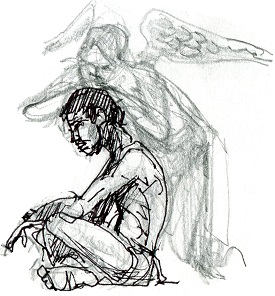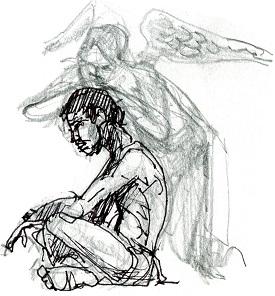

“Nothing that enters a person from outside, but the things that come out from within are what defile” (Mark 7:15).
1 Kgs 10:1-10; Mark 7:14-23
Jesus emerges from his confrontation with the scribes and Pharisees over hand washing and dietary restrictions with a little parable about the difference between digestion and the intentions of the heart. In Genesis, God gives Adam a tour of the garden with its luscious trees but warns him to stay away from the tree of the knowledge of good and evil. What we eat is less significant and dangerous than what we think about. Forbidden fruit opens us to temptation.
Food, like air and water, is at the center of all life. People in Jesus’ time spent much of their lives gathering and preparing food. Religion had a lot to say about eating, and it quickly became the focus of rules and restrictions. We live in a food culture. Most of the developed world has surpassed the issue of food security and so it concentrates on food quality, dining as recreation and on weight control. Wealth, it has been said, is the power to eat.
Again, Jesus focuses not on physical consumption but on human motivation. What we eat might make us sick, but it does not defile us spiritually or morally. It is what comes from our inner thoughts and desires that defiles who we are. Avarice or lust can consume a person, dominate their behavior, control their relationships and overwhelm their thoughts. Pride makes us imagine we are self-made and independent of others and even of God. We decide our own morality and live as we wish.
A virtuous person sees the world and other people not as objects of their desires but as subjects worthy of respect. The breakdown of this principle is the source of most of the sin and suffering in our world. The Creation story sets the stage for the entry of sin into the human heart. God provided every imaginable resource to Adam, surrounding him with bounty, beauty and security in a garden. But Adam is like a child, innocent and totally dependent on God. In order to prepare him to be friends with God, Adam must have the freedom to say yes or no for a real, mutual relationship of love to happen.
So, God tests Adam and Eve by telling them they must not eat from the tree of the knowledge of good and evil. Satan, God’s adversary, seduces them with the lie that if they eat from the tree, they will be God’s equal. Their eyes are opened, their innocence is gone and they see how naked and helpless they are. Paradise vanishes and the story of salvation is set in motion. God will send a second Adam to help humanity recover purity of heart so we can freely choose what is good instead of what is evil.
Jesus came to model human maturity and true freedom. One of the Beatitudes says that the pure of heart see God, why they can live in right relationship with the world and with one another. To be in communion with Jesus is to become his presence, to walk in the light that enables us to imitate and experience the divine image and likeness in us. It is said that we become what we eat. This is certainly true physically, but even more so in what we embrace and imagine in the recesses of our hearts.
Advertisement





